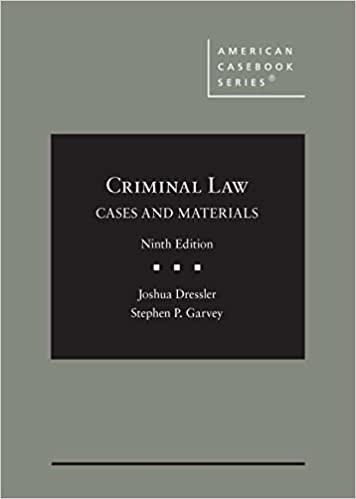Question
can you please present a case brief with Facts and procedural history Issue Rule of law Application and conclusion In July 2015, Olivia Grimes died
can you please present a case brief with
Facts and procedural history
Issue
Rule of law
Application
and conclusion
In July 2015, Olivia Grimes died when she fell from a three-person giant swing at the Carolina Point camp facility owned by Young Life. Phillip Wade Grimes, as personal representative of Olivia's estate, sued Young Life, as well as Inner Quest, the company that provided the materials and built the giant swing for Young Life. Inner Quest filed a crossclaim against Young Life, arguing that Young Life should indemnify it against any judgment. Young Life and Inner Quest entered a contract for the construction of the swing, which included an indemnification clause. Whether that indemnification clause would apply and what effect it would have on the relationship between Young Life and Inner Quest depended on whether the common law or the state UCC applied to it. Inner Quest and Young Life each filed motions for summary judgment on Inner Quest's crossclaim for indemnity. To determine the merits of the motions, the court had to determine what law applied to the hybrid contract between the parties for the construction of the swing.
Henry M. Herlong Jr., Senior United States District Judge [T]he parties disagree about whether the indemnity clause is enforceable. Young Life argues that the purpose of the contract was as a services contract primarily for the design and construction of the swing and, therefore, common law [applies]. . . . In contrast, Inner Quest argues that the contract was primarily for the sale of goods delivered in South Carolina and, therefore, the South Carolina Uniform Commercial Code's ("UCC") [applies]. . . . Thus, as an initial matter the court must consider whether the contract at issue is predominately a contract for services or the sale of goods to determine whether the UCC or South Carolina common law applies in this case. Where a contract is for the mixed sale of goods and services, South Carolina courts apply the predominant factor test to determine whether the UCC applies. Factors that the court may consider in determining whether a contract is for services or the sale of goods include "(1) the language of the contract, (2) the nature of the business of the supplier, and (3) the intrinsic worth of the materials involved." Coakley & Williams, Inc. v. Shatterproof Glass Corp., 706 F.2d 456, 460 (4th Cir. 1983).
Contracts which contain language primarily associated with the sale of goods, such as "buyer," "seller," "terms of sale," "customer," and "sales representative," are evidence that a contract is for the sale of goods. However, the court should consider the terminology in the context of the contract as a whole, rather than narrowly focusing on individual words. Additionally, the court may consider whether the contract was for a fixed price, the time and detail used to describe the goods and services to be provided, and the variety of services to be offered in the contract. In the instant case, the contract is predominately for construction services. The contract does not use terms such as sale, buyer, or seller, but instead uses "project," "construction," "client," and "installation" to describe the work to be done. Similarly, the contract provides only a summary list of materials to be provided, while providing in-depth descriptions of the services offered and provided. Additionally, while the contract contains a single price, the price is listed as an estimate and provides for possible adjustments based upon the cost of obtaining necessary parts for the swing. As a result, the terms of the contract reveal that the primary purpose of the contract was for construction services, rather than the sale of goods.
This finding is also supported by the nature of Inner Quest's business. Inner Quest's corporate representative stated that Inner Quest has two divisions: "[o]ne is responsible for design, installation, training [and] inspection . . . services vended to owners and operators of challenge courses," and "the other division is a programming division where we market and operate adventure-based challenge courses . . . on contract for schools and other businesses. . . ." By its own admission, Inner Quest's primary business focus is to provide services related to the design, construction, and operation of challenge courses, rather than to sell equipment. Lastly, the intrinsic value of the materials does not demonstrate that the contract is for the sale of goods. Both parties submit conflicting figures about the value of materials. Young Life argues that the cost of the swing's materials is no more than $12,000.00 of the approximately $36,000.00 total price. In contrast, Inner Quest argues that an additional $11,900.00 in costs should be factored in to account for the cost of the support poles and swing bar which support the swing. However, the cost of the support poles is composed of "both pole cost and installation." Because Inner Quest has not provided any further breakdown of the component and labor costs for the support poles and swing bar, the court can only speculate as to the intrinsic value of these components. Based on the foregoing, the contract in dispute is primarily for a services contract with the incidental sale of goods necessary only for the performance of those services. As a result, the UCC is not applicable to this case. * * * It is therefore ORDERED that Young Life's motion for summary judgment . . . is granted. It is further ORDERED Inner Quest's motion for summary judgment . . . is denied.
Step by Step Solution
There are 3 Steps involved in it
Step: 1

Get Instant Access to Expert-Tailored Solutions
See step-by-step solutions with expert insights and AI powered tools for academic success
Step: 2

Step: 3

Ace Your Homework with AI
Get the answers you need in no time with our AI-driven, step-by-step assistance
Get Started


